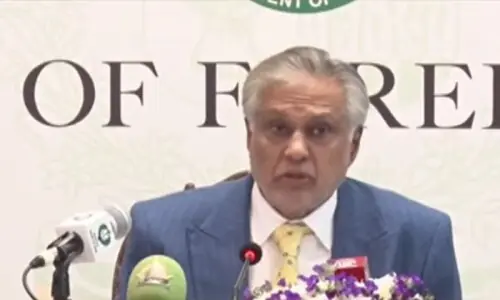ISLAMABAD: Prime Minister Nawaz Sharif has advised President Mamnoon Hussain to reject the mercy petitions of four convicted terrorists involved in the Dec 16, 2014, Tehreek-i-Taliban Pakistan attack on Peshawar's Army Public School.
The terrorists were sentenced to death by military courts.
While performing his constitutional obligation under Article 105 of the Constitution, the premier said Pakistan has changed after the Peshawar tragedy.
He said the brutal and merciless killing of our children convinced us that the perpetrators of such crimes do not deserve any mercy.
Immediately after the Army Public School tragedy, the state, elected representatives and political parties unanimously decided to bring the perpetrators of this crime to justice, even if it required amendments in law.
The prime minister said:
“Establishment of military courts through these amendments has enabled us to bring the perpetrators of the most heinous crimes to justice in a short span of time. The death sentence awarded to the four terrorists, in fact, was the will of the entire nation. By rejecting the mercy petition of these terrorists, I am also reflecting the will of the people and honouring the promise made to the families of my children who lost their lives in the Army Public School tragedy.”
The death sentences of the convicts involved in the APS attack were approved by the army chief in August this year.
Take a look: Army chief approves death sentences of 7 terrorists: ISPR.
Military courts
Political parties had unanimously agreed over the issue of setting up military courts to tackle terrorism cases in the country following the gruesome attack on the Army Public School in Peshawar in December 2014, following which the Parliament passed the 21st constitutional amendment in Jan 2015 to set up the said courts.
Editorial: Military courts: a wrong move.
President Mamnoon Hussain had also promulgated an ordinance further revising the recently amended Army Act to ostensibly aid the functioning of military courts by allowing for trials in camera, i.e without the presence of the public or the media, and over video link if necessary.
The Supreme Court in a majority ruling upheld the establishment of military courts in Pakistan.
Petitions challenging the 21st amendment were dismissed in August this year in a majority 11-6 vote of the 17-member SC bench. Chief Justice Nasirul Mulk and Justice Dost Muhammad announced the verdict.
In a 14-3 majority vote, petitions challenging the 18th amendment were also dismissed by the bench. Judges provided seven opinions and two additional notes on the ruling.































